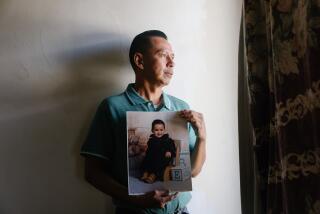The Miracle Baby : ‘She’s a Fighter’--and She’s 1 Year Old Today
- Share via
HACIENDA HEIGHTS — To her parents, she’s “our miracle baby.” She sits atop a space-age highchair. She breathes through a tube in her throat. And on her stomach, she sports an Ace bandage, wrapped snugly around a ball about the size of a cantaloupe.
It’s there to encircle the ball-like membrane that contains her liver, stomach and intestines.
The miracle is that Jessica Marie Beacom, born a year ago today with a usually terminal abdominal defect called omphalocele, is alive.
During the first six months after Jessica’s birth, doctors consistently told her parents, Mike and Vicki Beacom, that she probably would not live. But she grew bigger and stronger.
“She’s a fighter,” her mother said. “We were told so many times that she was terminal. We finally told doctors to stop telling us that, because they didn’t know.”
Gerald Nystrom, a neonatologist and assistant professor of pediatrics at Loma Linda University School of Medicine, said Jessica could recover completely if she grows enough. But the prognosis is uncertain, he said, because only 15 to 20 cases as severe as Jessica’s have been reported in the United States.
Every day, for almost a year, the Beacoms made the one-hour drive from their home in Hacienda Heights to Loma Linda University Medical Center to visit their daughter. Earlier this month, the doctors decided that Jessica, having grown to 24 pounds, could go home.
Her arrival, barely in time for her first birthday party today, has launched the Beacoms into a home life revolving around medical equipment, 24-hour nurses and constant vigilance.
Although they have both been laid off in the past few months, the Beacoms have tried to accept their situation with high spirits, despite their financial problems.
So far, Jessica’s medical expenses have exceeded $3 million. The couple have insurance to cover the cost of the nurses and their medical bills, but it will expire next February. They plan to apply for Medi-Cal, which offers their only hope of paying for Jessica’s ongoing medical expenses and the operations that lie ahead.
In the meantime, they constantly cuddle and kiss Jessica and tell her she’s beautiful when she smiles.
“She’s so special,” Mike Beacom said. “Some things you don’t have control over. . . . We believe in humor. You have to be able to laugh.”
Before the couple could bring their daughter home, they had to undergo a month of medical training on how to care for her. The Beacoms also have two nurses working 12-hour shifts.
It takes two people to bathe Jessica and wrap the Ace bandage around the protrusion outside her abdomen to prevent it from growing. When not in bed, Jessica sits strapped in a specially equipped highchair that has a ventilator and a battery attached to the back.
A wall shelf in Jessica’s pink bedroom is cramped with stuffed animals from well-wishers. The small room looks like any other child’s room except for the life-support systems.
On a floor shelf next to Jessica’s bed are instruments that monitor her heart and pulse rates and how well oxygen is being absorbed in her body. In a corner of the bedroom stands a four-foot-tall oxygen tank, and five smaller ones for traveling.
The couple have a remote-controlled alarm that makes a high-pitched buzz if Jessica coughs or disconnects a tube, or if the ventilator stops working.
Jessica, whose mental development is that of a normal 1-year-old, has undergone several operations during the past year. She had a skin graft to cover the external ball, surgery to correct a mild congenital heart defect, and a tracheotomy. A feeding tube was installed in her stomach.
Though they have so far managed the medical and emotional crises, Vicki, 28, and Mike, 36, have been pushed to the brink financially.
Both longtime employees of Rockwell International Corp. in Anaheim--where they met and married two years ago--they were laid off in a companywide reduction.
“We went from a (joint) income of $60,000 to nothing,” Vicki said.
They said they have exhausted all their savings and have been able to hang onto their house only because the mortgage payments are low. Some of their former co-workers helped out by purchasing a special air conditioner, which was a requirement for bringing Jessica home.
Mike said he’s willing to take any job that pays more than the $230 a week he receives in unemployment benefits, which will expire in November.
Vicki was receiving $160 a week, but her benefits ended recently, and she doesn’t plan on returning to the work force. Even with nurses working round-the-clock in her home, she said that caring for Jessica, her only child, along with Mike’s 10-year-old son from a previous marriage, has become her full-time job.
Omphalocele occurs often during early fetal development, Nystrom said, but usually corrects itself naturally before birth. Many babies born with omphalocele die within a few months because of bowel complications or breathing difficulties.
Because Jessica has survived, Nystrom is hoping that, as her chest cavity grows, increased pressure can be applied on the hernia to eventually squeeze it back in, enabling doctors to repair her abdominal wall.
There is still a possibility that Jessica might die if she develops bowel or breathing problems before the abdominal wall is repaired, which might take up to two years, he said.
Jessica’s parents, however, believe otherwise.
“I’m confident that she’ll definitely make it,” Mike said. “But if it’s God’s will that she doesn’t, then we’ll have to live with it. I have to love what He gives me.”
The Jessica Beacom Trust Fund has been set up at Security Pacific Bank, 2101 Hacienda Blvd., Hacienda Heights 91745.
More to Read
Sign up for Essential California
The most important California stories and recommendations in your inbox every morning.
You may occasionally receive promotional content from the Los Angeles Times.













